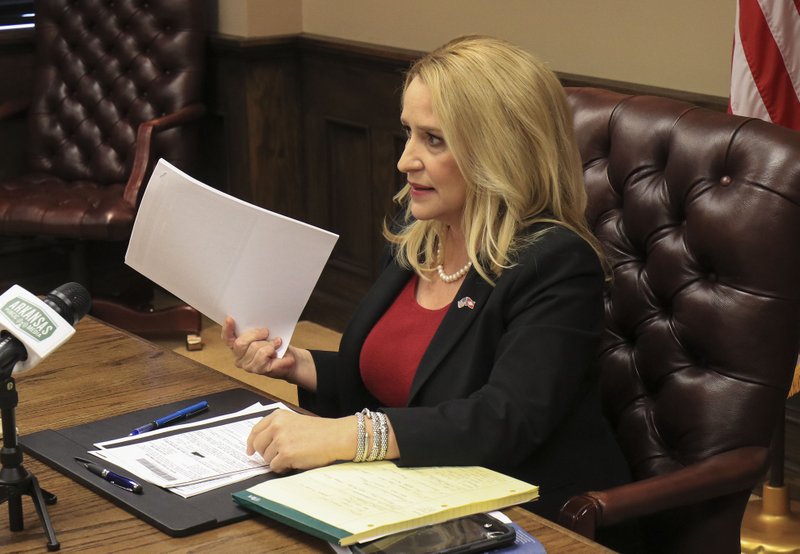The attorney general's office asked a federal judge Tuesday to stay an order he issued a day earlier prohibiting the state from enforcing a two-year blackout period on campaign contributions for candidates for state office.
The judge granted the request Wednesday.
"This decision means that Arkansas' contribution blackout period remains in effect while the 8th Circuit considers the court's injunction," Amanda Priest, communications director for Attorney General Leslie Rutledge, said later.
She was referring to the 8th U.S. Circuit Court of Appeals in St. Louis, which oversees federal courts in Arkansas. Rutledge's office filed a notice of appeal with the 8th Circuit on Monday, the same day U.S. District Judge James Moody Jr. issued a preliminary injunction to temporarily stop the law's enforcement until he can decide its constitutionality.
In what is quickly becoming a hot-button issue, the state contends that the injunction wasn't warranted because Peggy Jones, a Pulaski County woman who challenged the contribution blackout period in a lawsuit filed April 8, doesn't even have standing -- a vested interest in the outcome of the dispute -- to sue.
The blackout period is mandated under Arkansas Code 7-6-203(e), after being approved by voters in 1996 as a package of amendments to combat campaign corruption. Jones contends that it infringes on her right to political expression by preventing her from donating money now to candidates who plan to run for office in 2022.
Moody said during a June 12 hearing on Jones' request for an injunction that she needed to provide more information on how the law would affect her before he could decide if she had standing.
He said it would help if she identified a candidate she wanted to support in the 2022 election.
Jones then filed an affidavit the next day naming state Sen. Mark Johnson as one of several candidates she wants to support in the 2022 election, starting now. She said Johnson has told her he will be seeking re-election.
Moody's order granting the injunction -- and blocking the state from enforcing the blackout period -- followed on Monday.
The attorney general's office immediately filed a notice of appeal. Then in documents filed Tuesday asking Moody to stay the injunction while the 8th Circuit considers the appeal, Assistant Attorney General William Bird III reiterated the state's position that Jones doesn't have standing because she hasn't personally suffered some actual or threatened injury as a result of the law.
Bird cited a 2009 8th Circuit opinion saying that even though a plaintiff isn't required to wait to file a First Amendment challenge until she is facing criminal prosecution, she "must face a credible threat of present or future prosecution under the statute."
Naming Johnson as a candidate to whom she wants to contribute, Bird said, wasn't enough to give Jones standing. Noting that Jones didn't say whether any exploratory committee exists for Johnson's re-election bid, he said the risk she faces for donating outside the blackout period is "too speculative."
"A person who is not under prosecution should not be permitted to file suit in federal court to seek an advisory opinion," he wrote.
The blackout-period law subjects candidates who violate it to being prosecuted for a misdemeanor.
On Wednesday, Moody granted the request to stay the injunction without commenting.
But before the day was over, Jones' attorney, Chad Pekron of Little Rock, asked him to reconsider.
Pekron complained that by staying the injunction, the judge "allows the violation of [Jones'] rights to continue."
Pekron noted that Moody had already determined, in granting the preliminary injunction, that Jones is likely to win her lawsuit. He said that in seeking the stay, attorneys for the state "did not explain why that decision is wrong."
"The only interest that [the state has] put forward is an interest in enforcing a law that they have admitted does nothing to combat corruption and that this court has already determined is likely unconstitutional," Pekron wrote. "On the other hand, [Jones'] First Amendment right to make political contributions to candidates of her choosing is clearly being restricted every day the injunction is not in place. ... When in doubt, speech should be permitted, not restricted, particularly when the restriction at issue is likely unconstitutional."
Pekron indicated that it could take "a number of months" before the 8th Circuit takes up the appeal of the injunction.
He argued that the state hasn't identified how it will suffer by not enforcing the blackout period.
He said the court may believe that the harm caused to Jones by the stay is minimal because she can always make a campaign contribution later.
"But that is simply not the law," he wrote in a brief he filed Wednesday, "because the Eighth Circuit has made clear that the 'loss of first amendment freedoms, for even minimal periods of time, unquestionably constitutes irreparable injury.'"
He noted that the 8th Circuit's briefing schedule for the appeal indicates that final written briefs won't be due until late September, "raising the specter that a decision might not be entered until this case is essentially moot (at least for the 2022 election cycle). There is no question that delay will cause an irreparable harm to [Jones]."
Metro on 06/20/2019
